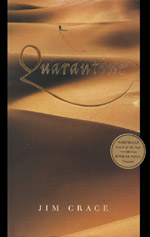 (Reprinted with permission from Commonweal, written by Luke Timothy Johnson.)
(Reprinted with permission from Commonweal, written by Luke Timothy Johnson.)
Jim Crace has pulled off the literary equivalent of a perfect triple-triple jump in ice skating. He has written a novel that has Jesus as its main character yet avoids reminding the reader of the Bible. Unlike all those lives of Jesus and historical Jesus reconstructions that end up making him seem like a cardboard figure, Crace’s tale draws the reader into an imaginative rendering that is so daring, so compelling, and so original that in it Jesus really does seem human. The story has moments of pure beauty and ones of dreadful cruelty. Crace has constructed a story about Jesus that is at once utterly different from that in the Gospels yet utterly believable, that on the surface recasts everything yet at its depth somehow retains everything.
Like all good apocryphal authors, Crace seeks a gap or seam in the biblical narrative to exploit. He finds it in Jesus’ fasting in the wilderness. Although Matthew and Luke narrate the encounters between Jesus and the tempter after his time of fasting, neither they nor Mark do more than report that Jesus fasted for forty days (Mk 1:12-13; Mt 4:1-11; Lk 4:1-13). This time of “quarantine” provides the occasion for Crace’s invention. Here are his fictional premises: First, the Judean desert is a place where people would spend a forty-day period of quarantine for religious purposes fasting in the ordinary manner—abstaining from food in the day but eating in the evening; second, Jesus is a young man barely past adolescence who is eager to be free of his village life and who embraces his fast in an extravagant and absolute fashion; third, Jesus and a collection of seekers (two women and four men) find themselves accidentally caught up in each other’s lives.
Needing a final drink of water before his total fast, Jesus enters the tent of Musa the trader, who has been abandoned to die of a fever by his caravan, tended only by his pregnant and abused wife Miri. Miri wants Musa dead, and is out digging a grave when Jesus enters the tent. Sipping from the water bag, Jesus hears the dying groans of Musa and, almost casually, blesses him. This changes everything.
Jesus enters the highest and most remote cave to test his faith in God. He eats nothing, drinks nothing, will not leave the cave. Musa rises from his deathbed determined to use this wonder worker as the means of recovering his fortune, directing all his guile to this end. Readers are drawn into the ensuing struggle by viewing the actions and sharing the fantasies spun by the minor male characters, the more prominent female characters, and above all by the agonists, Musa and Jesus, the tempter and the tempted—they also have fantasies.
There is some small part of Musa in awe of the one who healed him, but it is swallowed (as are all his fears) by the rage to dominate and control. Jesus, however, defines uncontrollability. As Jesus breaks from his boyhood, he is the exact opposite of Musa: totally lacking in calculation, heedless of consequences, stripping himself of food, water, clothing, testing his experience against his fantasies, forging possible ways of being a prophet like those of old, and finally releasing reason itself as his wasted body drains juice also from his soul. Though he never leaves the cave, never accepts the invitations of the other pilgrims, Jesus is the still point around which all the plot’s movements revolve.
Crace’s portrayal of Jesus is the novel’s most intriguing aspect. He creates a youthful mystic whose intoxication with God in prayer draws him ever deeper into a divine addiction. In the extremity of starvation, he is afraid of what his heedless love has done.
The novel’s epigraph quotes the opinion of two doctors concerning the possibility of a human surviving such an absolute fast without supernatural assistance. What happens to Jesus, and what happens to those whose lives for a period of quarantine hovered around his singular grasp for God, I leave to your reading. But I can say that the grave dug for the dying Musa—that served also as a surprising cistern to sustain the pilgrims—ends up serving still another function. And that everyone gets changed. It is, I assure you, different from anything you have yet imagined. And in its own way, is gospel.
Appetizer
In the Desert
Miri’s husband was shouting in his sleep, not words that she could recognize but simple, blurting fanfares of distress. When, at last, she lit a lamp to discover what was tormenting him, she saw his tongue was black—scorched and sooty. Miri smelled the devil’s eggy dinner roasting on his breath; she heard the snapping of the devil’s kindling in his cough. She put her hand on to his chest; it was soft, damp and hot, like fresh bread. Her husband, Musa, was being baked alive. Good news.
—from Quarantine